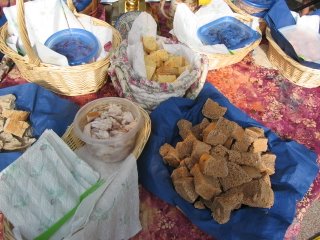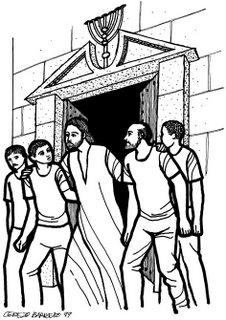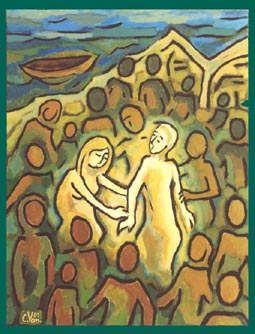Living Stories Part Two
John 6:24-35
I have a friend I’ve known my whole life. When we were children he developed cancer and received treatment for it. But he was over-radiated, which led to all sort of things. In high school he had to wear a back brace. A few years ago he started having heart trouble because the radiation had damaged his heart muscle. He then got married, but the marriage lasted only a few months. A few months ago they discovered cancer, again probably damage from the radiation. He is home in hospice care now.
I have a friend I’ve known my whole life. He was born into a loving and faith-filled family, the child of missionaries. He’s always been aware of the issues of justice and has always known how rich his life is. He played tennis in high school, was active in his youth group, and went to college where he developed many life long friendships. He became a teacher and loved mentoring students. He became active in caring for immigrants in his community. He is dying now, but he is surrounded by his family and friends and his faith community. He says he is blessed, he’s had a good life.
Same man. Same friend. The same story told in different ways.
The story of Jesus is one that is told in many different ways. Each Gospel presents his life with different details, different emphases. I mentioned a few weeks ago about what Matthew Mark and Luke are like - they are the most similar. The Gospel of John, though, has a different emphasis. It is quite different - doesn’t follow the same pattern of the others at all. John is the only Gospel in our Bible to say that Jesus is divine. That is a surprise - but Matthew, Mark and Luke don’t say it. They call Jesus Son of God, which is like how we say Child of God. John, however, is clear about Jesus identity - I am the Way, I am the Bread of Life, I am the Living Water.
Actually, there are several Gospels that the early church had that aren’t included in our Bible. The Gospel of Mary (Magdalene), The Gospel of Peter, The Gospel of Philip, The Gospel of Judas, and the Gospel of Thomas are some. Instead of being Lutheran or Catholic churches sometimes identified themselves as being followers of Thomas, or of Paul, or of John. We can see hints of this in some verses, and some competition between the different leaders.
This was during a very traumatic time for the church. The Christians were hunted and killed, martyred, for a long time. The movement grew anyway, but it was a dangerous time. One leader, Ireneaus, wanted to bring unity to the church - a common desire in times of crisis - and he was concerned about churches following different Gospels. So he put together the “fourfold Gospel,” the four we have today. Competition was especially strong between the Gospel of John and the Gospel of Thomas, so Ireneaus ordered all other Gospels destroyed, especially the Gospel of Thomas. And most of them were, except a group of errant priests took their holy texts and put them in a jar and buried them in the Egyptian desert at Nag Hammadi where they were found just a few decades ago.
I find this all very interesting. It raises some questions, too. One guy decided how many Gospels we should have hundreds of years later? Committees later approved the four Gospels, but that doesn’t make me feel too much better. Did he pick the right ones? Doesn’t this sound kind of political? Why is John so different? What did he know that the other writers didn’t? Do we have the picture of Jesus we need to have in our texts? What does this do to our faith?
I have a few thoughts about this. The church has lived with these Gospels for centuries. We have been shaped by them, by the way they work together as much as by what they are alone. Most of us can hardly tell which Gospel is which, they are all of one piece in some ways. And there’s Paul’s letters, and the other letters too, which fill out our scripture about Jesus. Jesus promised - in the Gospel of John, of course -- that the Spirit would come to us and help us in our interpretation of things. That is some comfort.
I was a Jurisdictional delegate twice, where I went to elect Bishops for the United Methodist Church. One of the elder clergy said to us early on, “You will be shocked by how political this process is. But don’t fool yourself: God works in politics too.”
Back to my friend. I visited him a few weeks ago and he told me how blessed he felt in his life. "I'm so blessed," he said. I've thought about this since then, and I think the reason he can say this must be because of his faith. He has read his story through the lens of the Jesus story. Because his story is seen in the context of Jesus’ story, his own story is changed. He has grown up knowing that God is present in suffering, that in Christ there is new life, and that death is not the end of things. Reading his story through the Christ story he can say, in spite of everything, "I am blessed."
However this book got put together, it works in incredible ways. The brilliance of Ireneaus’ plan is to have four Gospels, four different Gospels that each give us a different picture of Jesus. The Jesus we know is not the Jesus of just one book, but of many. The Jesus we know is made up of all the Gospels running together, and Paul too, and of the space between them. The story of Jesus is a living story, and when the story of our lives encounters it our own story is changed, rewritten, retold into a story of blessing, of walking with God, and of new life. Amen.
Here are some additional readings that I included in our Weekly Meditations this week:
The implicit connection between the feeding of the five thousand and the exodus story is made explicit in John. In his discourse, John explicitly refers to Israel’s ancestors being fed with many in the wilderness. But John’s point is not simply similarity to the exodus; he also emphasizes contrast. While Jesus “gives life to the world” as “the bread of life,” the manna of the exodus did not give life: “Your ancestors ate the manna in the wilderness, and they died.” What Moses gave them was not the true bread from heaven. But Jesus is “the true bread” and “the living bread,” and “whoever eats of this bread will live forever.”
Thus in John the point is not really that Jesus now feeds people in the wilderness as God did in the exodus story. The point, rather, is that Jesus provides that which was not provided in the time of the exodus: living bread. - Marcus Borg, Reading the Bible Again for the First Time
“(The Gospel of John’s) Jesus does not offer ethical and apolcalyptic teachings as he does in Mark, Matthew and Luke; he delivers no “sermon on the mount,” no parables teaching how to act, no predictions of the end of time. Instead, in John’s gospel - and only in this gospel - Jesus continually proclaims his divine identity, speaking in what New Testament scholars call the “I am” sayings: “I am the way; I am the truth; I am the light; I am the vine; I am the water of life” - all metaphors for the divine source that alone fulfills our deepest needs. What John’s Jesus does require of his disciples is that they believe: “You believe in God; believe also in me.” …
The spiritual life received in baptism requires supernatural nourishment; so, John’s Jesus declares, “unless you eat the flesh of the Son of Man and drink his blood, you have no life in you. Those who eat my flesh and drink my blood have eternal life, and I will raise them up on the last day, for my flesh is true food, and my blood is true drink.” Jesus offers access to eternal life, shared when those who believe join together to participate in the sacred meal of bread and wine that celebrates Jesus’ death and resurrection. - Elaine Pagels, Beyond Belief
I have a friend I’ve known my whole life. When we were children he developed cancer and received treatment for it. But he was over-radiated, which led to all sort of things. In high school he had to wear a back brace. A few years ago he started having heart trouble because the radiation had damaged his heart muscle. He then got married, but the marriage lasted only a few months. A few months ago they discovered cancer, again probably damage from the radiation. He is home in hospice care now.
I have a friend I’ve known my whole life. He was born into a loving and faith-filled family, the child of missionaries. He’s always been aware of the issues of justice and has always known how rich his life is. He played tennis in high school, was active in his youth group, and went to college where he developed many life long friendships. He became a teacher and loved mentoring students. He became active in caring for immigrants in his community. He is dying now, but he is surrounded by his family and friends and his faith community. He says he is blessed, he’s had a good life.
Same man. Same friend. The same story told in different ways.
The story of Jesus is one that is told in many different ways. Each Gospel presents his life with different details, different emphases. I mentioned a few weeks ago about what Matthew Mark and Luke are like - they are the most similar. The Gospel of John, though, has a different emphasis. It is quite different - doesn’t follow the same pattern of the others at all. John is the only Gospel in our Bible to say that Jesus is divine. That is a surprise - but Matthew, Mark and Luke don’t say it. They call Jesus Son of God, which is like how we say Child of God. John, however, is clear about Jesus identity - I am the Way, I am the Bread of Life, I am the Living Water.
Actually, there are several Gospels that the early church had that aren’t included in our Bible. The Gospel of Mary (Magdalene), The Gospel of Peter, The Gospel of Philip, The Gospel of Judas, and the Gospel of Thomas are some. Instead of being Lutheran or Catholic churches sometimes identified themselves as being followers of Thomas, or of Paul, or of John. We can see hints of this in some verses, and some competition between the different leaders.
This was during a very traumatic time for the church. The Christians were hunted and killed, martyred, for a long time. The movement grew anyway, but it was a dangerous time. One leader, Ireneaus, wanted to bring unity to the church - a common desire in times of crisis - and he was concerned about churches following different Gospels. So he put together the “fourfold Gospel,” the four we have today. Competition was especially strong between the Gospel of John and the Gospel of Thomas, so Ireneaus ordered all other Gospels destroyed, especially the Gospel of Thomas. And most of them were, except a group of errant priests took their holy texts and put them in a jar and buried them in the Egyptian desert at Nag Hammadi where they were found just a few decades ago.
I find this all very interesting. It raises some questions, too. One guy decided how many Gospels we should have hundreds of years later? Committees later approved the four Gospels, but that doesn’t make me feel too much better. Did he pick the right ones? Doesn’t this sound kind of political? Why is John so different? What did he know that the other writers didn’t? Do we have the picture of Jesus we need to have in our texts? What does this do to our faith?
I have a few thoughts about this. The church has lived with these Gospels for centuries. We have been shaped by them, by the way they work together as much as by what they are alone. Most of us can hardly tell which Gospel is which, they are all of one piece in some ways. And there’s Paul’s letters, and the other letters too, which fill out our scripture about Jesus. Jesus promised - in the Gospel of John, of course -- that the Spirit would come to us and help us in our interpretation of things. That is some comfort.
I was a Jurisdictional delegate twice, where I went to elect Bishops for the United Methodist Church. One of the elder clergy said to us early on, “You will be shocked by how political this process is. But don’t fool yourself: God works in politics too.”
Back to my friend. I visited him a few weeks ago and he told me how blessed he felt in his life. "I'm so blessed," he said. I've thought about this since then, and I think the reason he can say this must be because of his faith. He has read his story through the lens of the Jesus story. Because his story is seen in the context of Jesus’ story, his own story is changed. He has grown up knowing that God is present in suffering, that in Christ there is new life, and that death is not the end of things. Reading his story through the Christ story he can say, in spite of everything, "I am blessed."
However this book got put together, it works in incredible ways. The brilliance of Ireneaus’ plan is to have four Gospels, four different Gospels that each give us a different picture of Jesus. The Jesus we know is not the Jesus of just one book, but of many. The Jesus we know is made up of all the Gospels running together, and Paul too, and of the space between them. The story of Jesus is a living story, and when the story of our lives encounters it our own story is changed, rewritten, retold into a story of blessing, of walking with God, and of new life. Amen.
Here are some additional readings that I included in our Weekly Meditations this week:
The implicit connection between the feeding of the five thousand and the exodus story is made explicit in John. In his discourse, John explicitly refers to Israel’s ancestors being fed with many in the wilderness. But John’s point is not simply similarity to the exodus; he also emphasizes contrast. While Jesus “gives life to the world” as “the bread of life,” the manna of the exodus did not give life: “Your ancestors ate the manna in the wilderness, and they died.” What Moses gave them was not the true bread from heaven. But Jesus is “the true bread” and “the living bread,” and “whoever eats of this bread will live forever.”
Thus in John the point is not really that Jesus now feeds people in the wilderness as God did in the exodus story. The point, rather, is that Jesus provides that which was not provided in the time of the exodus: living bread. - Marcus Borg, Reading the Bible Again for the First Time
“(The Gospel of John’s) Jesus does not offer ethical and apolcalyptic teachings as he does in Mark, Matthew and Luke; he delivers no “sermon on the mount,” no parables teaching how to act, no predictions of the end of time. Instead, in John’s gospel - and only in this gospel - Jesus continually proclaims his divine identity, speaking in what New Testament scholars call the “I am” sayings: “I am the way; I am the truth; I am the light; I am the vine; I am the water of life” - all metaphors for the divine source that alone fulfills our deepest needs. What John’s Jesus does require of his disciples is that they believe: “You believe in God; believe also in me.” …
The spiritual life received in baptism requires supernatural nourishment; so, John’s Jesus declares, “unless you eat the flesh of the Son of Man and drink his blood, you have no life in you. Those who eat my flesh and drink my blood have eternal life, and I will raise them up on the last day, for my flesh is true food, and my blood is true drink.” Jesus offers access to eternal life, shared when those who believe join together to participate in the sacred meal of bread and wine that celebrates Jesus’ death and resurrection. - Elaine Pagels, Beyond Belief




